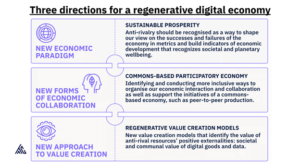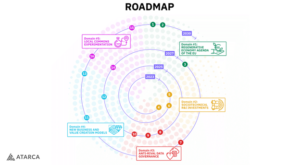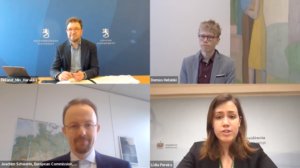Mapping a pathway towards regenerative digital economy – 4th ATARCA Policy Observatory

Digitalisation and data have become the driving forces of our economic system with fundamental implications for human interaction and societal power structures. Yet technological development has created novelties which fit poorly together with institutional structures and governance architecture created in the previous era. Our current economic structures and institutions therefore need a fundamental reform to fully leverage digital, often anti-rival resources.
This tension was at the core of the fourth and final Policy Observatory of ATARCA, which brought together over 30 participants to discuss and scope a roadmap towards a more sustainable and regenerative data economy in Europe. The Observatory, which was held on 9 March 2023 marked the release of ATARCA’s policy brief that gathered the project’s policy recommendations into an actionable and forward-looking roadmap. The observatory brought together a high-level panel discussion, composed of:
- Timo Harakka, Minister of Transport and Communications of Finland;
- Lidia Pereira, Member of the European Parliament, EPP; and
- Joachim Schwerin, Principal Economist in the Directorate-General Internal Market, Industry, Entrepreneurship and SMEs (DG GROW) of the European Commission.
DIGITAL ECONOMY IN A TRANSFORMATION
To open the session, Mr. Johannes Mikkonen, Senior policy expert on digital governance at Demos Helsinki, introduced the context for the recommendations. He underlined the key premises of ATARCA, namely the anti-rival nature of digital goods; the mismatch between our current economic structures with anti-rival resources; and the potential of distributed ledger technologies such as blockchain to create new incentives and mechanisms for anti-rival sharing. Mr. Mikkonen pointed out that, by solving the efficient allocation of digital goods and their benefits in a socially optimal and equitable way, we can create opportunities for a more regenerative digital economy – an economy which would be ecologically and socially sustainable.

To illustrate what a regenerative digital economy could look like, Mr. Mikkonen introduced three shifts in the realms of new economic paradigm, new forms of economic collaboration, and novel approaches to value creation. The first shift, sustainable prosperity, refers to the emerging movement challenging the gridlock of growth-based models on our economic system. To mitigate and omit the socially and environmentally adverse outcomes of only using GDP as an indicator, we should instead utilise anti-rivalry to focus on prosperity as different from economic growth. The second shift, commons-based participatory economy would mean a more effective utilisation of digital technologies in support of commons-based economic governance as well as more participatory and inclusive economic interaction. The third shift, regenerative value creation models mean creating new incentives and mechanisms for capturing value from data and digital goods, such as peer-to-peer and freemium as business models. This can help to lessen the social and economic inequalities datafication of society has contributed to.
POLICY ROADMAP
The recently published policy recommendations and roadmap were specifically created to advance the above-mentioned shifts towards regeneration. As they consist in total of sixteen recommendations with subcategories, Mr. Mikkonen focused on explaining the five domains, under which the recommendations are clustered together. In addition, he highlighted one recommendation for each domain. The domains are complementary to each other in that they focus on different development areas with interlinkages:
- Regenerative economy agenda of the EU
- Sociotechnical R&I investments
- Anti-rival data governance
- New business and value creation models
- Local commons experimentation
The individual recommendations indicate which kinds of actions we consider to be of key importance in the renewal of our economies to foster their digital potential. First of all, as a paradigm level change, recommendation 2 states that “anti-rivalry should be recognised and embedded in economic visions and policies of the EU in a cross-sectoral approach”. More specifically this means understanding and approaching anti-rivalry broadly as a perspective connecting data commons, public goods, cooperatives, open-source resources and sustainability across policies. On the other hand, at the policy level it is crucial to steer our R&I investments in a way that would prevent public funding programs from “falling into techno-solutionism and instead promote inclusive socio-technical perspectives” as recommendation 4 states.

In the context of anti-rival data governance, Mr. Mikkonen brought up the need to “develop commons-based data governance such as data commons and unions”, and to “expand the regulatory efforts around data commons such as Open Data Directive into the private setting to support sharing of data for the public good” as per recommendation 7. Moreover, in support of new business and value creation models, it is be important that “public institutions should promote and support digital public goods and digital open commons”, as well as encourage the EU to “promote digital open commons by establishing a ‘European incubator for digital commons’” as per recommendation 11. And finally, indicating the need for experimentation, Mr. Mikkonen emphasised the potential of steering “DLT pilots and regulatory sandboxes towards community experimentation with platform cooperatives and democratic DAOs” in accordance with recommendation 17.
DISCUSSION ON THE FUTURE
Dr. Schwerin from the European Commission started the panel discussion by remarking that DLT is not just any technology, but something that for the very first time has enabled a trustworthy and secure interaction between individuals and collectives all over the globe. The European Commission has backed DLTs such as blockchain since 2015 in an opportunity-driven fashion by declaring it as one of the breakthrough technologies supported across policy fields. As such, we should not be misguided by the fact that DLT started in the financial domain but also recognize the wider economic benefits of the technology for European citizens and SMEs. Moreover, DLT has an inherent social dimension to it because of its decentralised nature, which is tied with the history of Europe. This is opposed to the top-down approach that we have seen in many other parts of the world, currently driven by big tech companies that extract data from individuals users. From this perspective, DLT and blockchain is not only an enabling technology for economic opportunities, but it is also a social exercise on data ownership that is fully embedded in the European policy framework on data.
Minister Harakka provided unique insights from the perspective of a sitting minister, having recently written a book “Data Capitalism in the World of Crisis”. He emphasised the need for a holistic approach to blockchain technology and policies, looking beyond financial instruments to more comprehensive data sharing solutions. The minister highlighted that trust, transparency and security always come first for citizen acceptance of these technologies and stressed the need for anti-rivalry in understanding the shift to web 3.0. Tokenization will likely be developed alongside traditional solutions, and interoperability is key for innovation and competition in data economy, as well as for building resilience within digitalized societies. Minister Harakka also noted the importance of digital commons and open standards as a way of promoting more democratic and citizen-driven development of the data economy.

Ms. Pereira highlighted the importance of Europe taking a lead in the digital revolution that is currently taking place through decentralisation. Europe cannot afford to be left behind on the web 3.0 as in previous digital revolutions, necessitating investments into technology and an innovation-friendly environment. This means a balanced legislative framework that takes into account proportionality, responsibility, and coherence of the regulation, especially from the perspective of SMEs. Ms. Pereira saw the need to focus on the underlying technology itself, blockchain, rather than on cryptocurrency and the recent scandals surrounding it. In fact, blockchain can be utilised as a solution in various industries, including financial and banking services, even down to modernising national tax systems if done correctly.
The ensuing discussion focused on the intensifying geopolitical competition surrounding digital and blockchain technologies and the role of anti-rivalry in the midst of it. The panellists emphasised the need for the European Union to enhance its common voice and soft power in the international system, in which regulations such as MiCA can play an important role. Fostering better transatlantic relations and building stronger alliances and partnerships around the world on digital commons and flow of data were also seen as positive pathways.
The event was concluded by Dr. Anna Björk, research area lead at Demos Helsinki, where she focuses on the societal impact of emerging digital technologies. She reflected on the past two years of the ATARCA project and its policy observatory process, which was designed to support the interpretation of the project’s research results from the perspective of digital and economic policies of the European Union. Dr. Björk noted how the discourse and audience for anti-rivalry and digital economy has gained more ground during this time, towards a greater recognition of anti-rival economic thinking. Finally, she gave an overview of recent and future activities at Demos Helsinki, which seek to further reflect and develop ATARCA’s findings and the concept of regenerative digital economy.
We wish to wholeheartedly thank everyone who has been involved in the Policy Observatory process.
You can watch a recording of the observatory here.

This project has received funding from the European Union's Horizon 2020 research and innovation programme under grant agreement No 964678. The content of this website does not represent the opinion of the European Union, and the European Union is not responsible for any use that might be made of such content.